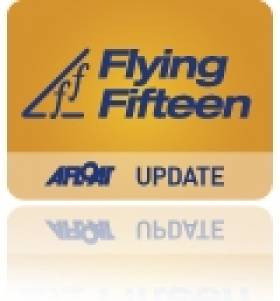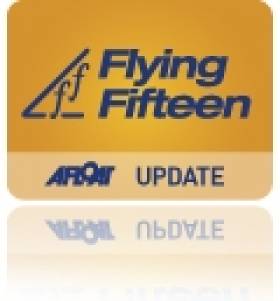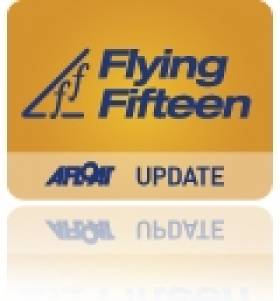Displaying items by tag: Charles Apthorp
#flyingfifteen – Frequent visitor to Ireland, UK Flying fifteen champion Charles Apthorp, sailing with Alan Green, produced four wins at the East Coast Championships to be unstoppable at a windy County Antrim Yacht Club at Whitehead yesterday. The National Yacht Club's David Gorman and Chris Doorly were second (on tie– break) in the 20–boat fleet with County Antrim's own Bryan Willis and John McPeake third. Full results downloadable below.
On Saturday three races were held in 10-25 knots of breeze from the west/sw. Being so close to the land it was shifty towards the shore and the wind coming around the headland also had an impact on conditions. Racing started at 2pm,
Race 1: the tide was going out towards the north and this held boats back on the line, the pin was favoured and with the wind out on the left it was important to get a good start. Gorman got a great start and soon tacked across the fleet, he led at the weather mark with Apthorp hot on his heels, Apthorp took the lead on the run and held it to the end, on the second beat Gormans outhaul broke and he was out of the race, not good to use your discard so early but he was up and running for the next race. Mc Cleery was second with Malcolm Crichton & Barry Bridges (SSC) third.
Race 2: The wind and rain were lashing the fleet at this stage. Apthorp won comfortably with Gorman chasing him all the way to be a comfortable second. There was confusion as to how many laps were sailed, after three there was no blue flag up so the fleet sailed another but it didn't affect positions. Chamberlain broke his jib halyard and at the weather mark there was a pile up involving three boats with the end result a large hole in Marcus Crichtons boat- no more sailing for him and his crew Roy.
Race 3: the boat end was favoured, Apthorp got away as Gorman got held up at the start by boats sailing over and not going up to keep clear as they should at the start, despite this he was up in third place at the weather mark behind Apthorp and McCleery. On the next beat the two leaders sailed to the left as Willis, Gorman and Mathews headed in towards the shore, this paid and the three were really close all the way to the finish line, the downwind leg was particularly exciting with boats vying for inside position at the last leeward mark. Local man Brian Willis & John McPeak deservedly won with Mathews second , Gorman third with Apthorp and McCleery back quiet a bit in fourth and fifth place.
On reaching the shore after the three races the well organised helpers on the slip were a welcome sight as were the soup and bread rolls. There was an excellent meal provided later in the club and the revelry in this fine club went on late into the night.
For Sunday the forecast was for the strong winds to continue but on arrival it was moderate, there was an early start so we could get in before the low tide.
In Race 4: Gorman got squeezed out at the start and had to turn round and start in the second lane at the committee boat, he headed in towards the shore but left paid and Apthorp led all the way with McKee, Chamberlain and Crichton all chasing. The wind was up now particularly further out of the shelter of the land and there was some great downwind sailing. On the last beat Gorman worked hard on the shifts and just managed to pip Chamberlain and Crichton on the line. The win was enough for Apthorp & Green to retain the title they won last season.
Race 5 was a triangle Olympic course with some hard reaches thrown in just to tire the already tired crews. Gorman lead at the weather mark but was overtaken on the reach by the heavier crew on Frequent Flyer. After some great reaches and close racing Apthorp and Gorman got well ahead of the pack on the second beat to finish in first and second place in the race and overall. Chamberlain was third with Irish Champion McCleery & Dougan fourth in Race 5. Small consolation for Gorman & Doorly is that they are back on top of the Irish Ranking table.
At the prize giving local class captain and Commodore thanked the sponsors and the many volenteers including the PRO and his team. On behalf of the winning crew Alan Green also thanked all involved in the club and also his fellow competitors who all made the effort to travel to this great part of the Irish coastline.
The next event is the Northern Championships which will be held in Whiterock Stangford Lough in June.
#ff – Visiting former world champion Charles Apthorp showed the Dublin Bay fleet a clean pair of heels winning the two DBSC races in Frequent Flyer with Alan Green as crew.
There were about ten boats training with Apthorp in light winds on a short course inside the harbour prior to the DBSC racing. Following the training everyone was keen to get going in the races and practice their new or improved skills. The wind had begun to build up from the se/south as forecast a the tide was flooding. Seventeen boats started the first race, in close racing the Meaghers who were sailing fantastically fast lead at the first mark followed by Apthorp/Green, Mulvin, Colman and Gorman. Apthorp gybed to the left of the course and took the lead but the Meaghers were tucked in behind them.
On the next beat the wind shifted to the south, Gorman got up to second and Colman third, it became a soldiers race for the remaining two laps but as Gorman got stuck in traffic with other boats Colman was quick to pounce and take second place with Gorman third, the Meaghers fourth and Dumpleton/McNeilly fifth
The second race started after the PRO changed the course, by now the wind was force 4/5 and we were given 4 laps- it was going to be a long afternoon! The fleet split going up the beat and Athorpe came to the weather mark first from the right side with Gorman second from the left side. Downwind the fleet bunched up but on the beats it was generally favoured to go right towards the shore and the shallower waters for less tide. Not a lot changed in the race, crews were busy hanging in there in the by now windy conditions. Athorpe won the race comfortably with Gorman second, Dumpleton third and Colman fourth. Club Rear Commodore and fireball sailor Frank Cassidy was helming in 3773 with Joe Hickey crewing and finished sixth.
Once again it was great racing and fantastic to see such a large turnout. Special thanks to Charles Apthorp for coming over and coaching and racing with us. A lot was learnt and hopefully it can be put in practice when the fleet travel to Cushendall for the Northern Championships this weekend. Once ashore and packed the fleet had a very enjoyable bbq in the NYC organised by our class captain Nikki and her committee.
#flyingfifteen – British Flying fifteen ace Charles Apthorp will lead a training day for one of Dublin's biggest one design keelboat fleets on Saturday, June 7th.
The former World and British champion from Hayling Island Sailing Club will focus initially on the critical area of mast set-up in the 20–foot keelboat.
The training will start at 10am at the National Yacht Club before on the water tuition that will lead into DBSC racing where the class has been achieving turnouts of up to 18 boats for Bay competition.
































































